
- Degree
- Bachelor of Arts
- Supplement to degree
- minor in a multi-subject bachelor’s programme
- Admission restriction
- without admission restriction (without NC)
- Duration
- 6 Semesters
- Credits/ECTS
- 60
- Teaching language
- German
- Tuition fee
- None
- Semester contribution
- € 305,05
- Start of studies
- Winter semester
- Part-time possible
- Yes
- Institutions
- Faculty of Arts
- Institute of Classics
Programme content
Latin Studies deals with the written legacy of the Roman Republic and the Imperium Romanum, especially in the works of Roman authors. Roman History, Art, Philosophy, Cultural and Religious History are included in the study and research of language and literature. The requirements and after-effects of the Latin language and literature are also taken into account. You will acquire knowledge, skills and methods in the academic understanding of Latin language and literature. In addition, you will acquire basic knowledge of Classical Studies and Ancient History as well as a neighbouring discipline. You will acquire the competence|ability|qualification to read, interpret and reproduce Latin texts independently and to comment independently on a scientific question.
Structure
Multi-subject bachelor’s programme
Picture: Sophie Bartholomehe Bachelor's degree is the first professional qualification. The standard period of study|regular programme length is a total of six semesters, during which various types of courses (e.g. seminars, lectures or tutorials) are offered for the individual modules.
A multi-subject Bachelor's degree consists of a major subject with 120 credit points (abbreviation: LP / 1 LP = 30 hours of attendance, preparation and follow-up work|follow-up activity, learning and assessed coursework and examinations) and a supplementary subject with 60 LP.
The supplementary subject »Latin Studies« consists of five compulsory modules and one required elective module.
Why study in Jena?
Latin Studies is taught in Jena at a well-developed Institute of Classics. There is an interdisciplinary network with subjects beyond this institute, such as Indo-European Studies. Work and contact opportunities within the institute also facilitate personal study. The central university library has a rich and valuable collection of old books that is unique in the Central German (subject) area|field and a wide-ranging collection of the latest and most recent specialist literature in a humanities library with good access to the literature of neighbouring subjects.
What can you do after your studies?
Career opportunities:
The skills acquired on the Bachelor's degree programme open up career prospects in a wide variety of fields, depending on the major subject chosen. Knowledge of Latin language and literature is a valuable additional qualification for a large number of humanities subjects.
Downloads and links for the degree programme
What are we looking for in prospective students?
The subject is aimed at all those who, in addition to a major subject in the humanities, particularly in Philosophy, History, Literary Studies of Modern Languages and Linguistics (especially Indo-European Studies), wish to acquire basic knowledge of Classical Studies and Ancient History and place a strong focus on Latin literature and Philosophy, which also includes a thorough training in the Latin language.
Admission requirements
-
University entrance qualification
A university entrance qualification, such as a general secondary school leaving certificate, is required for admission onto the study programme.
More information on university entrance qualifications can be found here.
-
Language requirements
Latinum, knowledge of Greek, one modern foreign language; proof by the time of registration for the Bachelor's thesis at the latest
Contacts
Room 201
Fürstengraben 25
07743 Jena
Google Maps site planExternal link
Opening hours:
Di 12:00-13:00 Uhr bzw. nach Vereinbarung
Bachstraße 18k
07743 Jena
Telephone hours:
Mondays and Fridays (9:00 – 11:00)
Wednesdays (13:00 – 15:00)
The ASPA is primarily responsible for students in the Faculty of Social and Behavioural Sciences, the Faculty of Arts and Humanities, and the Faculty of Theology.
Postal address:
Akademisches Studien- und Prüfungsamt
Fürstengraben 1
07743 Jena
University Main Building / SSZ
Fürstengraben 1
07743 Jena
Google Maps site planExternal link
Office hours:
We offer consultations in person, by telephone, and via Zoom. You can make an appointment by calling us on +49 3641 9-411111 (Mondays to Fridays from 9:00 to 11:00) or outside these office hours on +49 3641 9-411200. You can also use our remote help desk.
Consultation hours:
Mondays, Tuesdays, Thursdays and Fridays (9:00 to 12:20), Tuesdays (14:00 to 18:00), and Wednesdays and Thursdays (14:00 to 16:00).
Video chat: To the video chat – Zoom Videochat ZeitenMondays to Fridays (12:30 to 13:00) Password ZSB2020 Data protection informationpdf, 101 kb
University Main Building, Room E065
Fürstengraben 1
07743 Jena
Google Maps site planExternal link
Opening hours:
Information Desk (UHG; Room E0.65)
Mondays (10:00 – 12:00)
Tuesdays (13:00 – 15:00)
Wednesdays (10:00 – 12:00)
Thursdays (13:00 – 15:00)
Fridays (10:00 – 12:00)
You can also use our remote help desk at
www.uni-jena.de/service-ssz
or send us your enquiries by post.
Telephone hours:
Mondays to Fridays
(9:00 – 11:00)
Postal address:
Friedrich-Schiller-Universität Jena
Studierenden-Service-Zentrum
07737 Jena
University Main Building
Fürstengraben 1
07743 Jena
Google Maps site planExternal link
